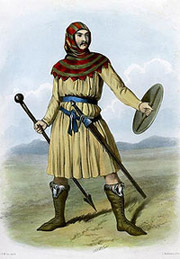WordPress database error: [Got error 28 from storage engine]
SELECT t.*, tt.*, tr.object_id FROM wp_terms AS t INNER JOIN wp_term_taxonomy AS tt ON tt.term_id = t.term_id INNER JOIN wp_term_relationships AS tr ON tr.term_taxonomy_id = tt.term_taxonomy_id WHERE tt.taxonomy IN ('category', 'post_tag', 'post_format') AND tr.object_id IN (19718) ORDER BY t.name ASC
Clan McIver History
McIver, or in its Gaelic MacIomhair, means ‘son of Ivar’, and comes from the Norse personal name Ivarr.
In 1291, a Douenaldus filius Makbeth mac Ywar was one of the perambulators of the boundary between the barony of Kynblathmund and the lands of Arbroath Abbey.
The sheriffdom of Lorne were erected out of lands owned by Malcolm McIuyr in Lorn, in 1292.
Duncan Yvari (i.e. MacIver) was granted a royal remission in 1427.
The constable of Dundee, James Srimgeoure, had Archibald Makevire of Pennymoure as an attorney in 1479. Archibald’s sons Archibalde Makewor and Eware Makewore appeared as witnesses on the same document for the constable of Dundee.
In Argyllshire, in 1488, Donald M’Kywyr witnessed a charter in Sonnachan.
Duncan Campbell, or M’Keuir of Stroneschero, in 1562, had a grant for the lands of Killeane and Lealt in the Stewarty of Glenyary.
Vassals of Campbell of Glenurquhay in 1638 included Eiure M’Onochie VcEiure and John M’Eiure in Cloichran, John M’Euiure in Kendmoir (now Kenmore), and Archibald M’Cuiure.
In Elgin, in 1745, there was a shoemaker called Evander McKiver.
It is said that the Macivers are descended from Iver Crom, who was the illegitimate son of Gillespick, son of Callen maol math, ‘good bald Coline’, who was married to a niece of Alexander I.
However, since Iver was such a common forename in Scotland, it would be impossible to name the particular Iver from who the McIvers take their name.
Clan McIver Posts







